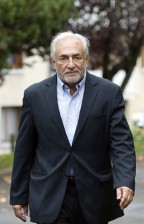Disgraced IMF chief Strauss-Kahn charged in new scandal
PARIS—One of the world’s most prominent public figures and formerly a frontrunner for the French presidency, disgraced former IMF chief Dominique Strauss-Kahn has been tainted by a series of sex scandals.
In the latest twist in a string of cases that have tarnished the image of the former head of the International Monetary Fund, lawyers said Monday he had been charged over alleged involvement in a vice ring.
The charges came after a French investigation into a network that imported sex workers from Belgian brothels to France for orgies in high-class hotels in Lille and Paris came upon Strauss-Kahn’s name in witness testimony.
Though he has been forced to confess to living an unbridled and promiscuous private life, the 62-year-old has repeatedly denied resorting to violence.
Claims about Strauss-Kahn’s private life had always dogged his career and his New York arrest sparked a scandal that destroyed his hopes for the 2012 French presidency after a failed bid for the Socialist candidacy in 2006.
A gifted orator, fluent in English and German, silver-haired Strauss-Kahn is married to Anne Sinclair, one of France’s best loved journalists and editor of the French version of the web journal The Huffington Post.
Article continues after this advertisementShe has remained by his side throughout his ordeals.
Article continues after this advertisementBorn to a Jewish family in the rich Paris suburb of Neuilly-sur-Seine on April 25, 1949, Strauss-Kahn spent part of his childhood in Morocco and later studied at the elite Paris schools Sciences-Po and HEC.
He entered politics in 1986, winning a parliamentary seat to represent the Haute-Savoie region in the Alps, and was later elected in the Paris region of Val d’Oise in 1988.
Named finance minister in 1997, Strauss-Kahn was forced to step down two years later because of allegations that he had received payments from a student health insurance fund for legal work he did not perform.
He was cleared of any wrongdoing in that case in 2001.
The former economics professor won respect in Europe as France’s finance minister from 1997 to 1999.
During that time, he took part in negotiations to create the single European currency, the euro, and generated a wave of privatisations, including that of France Telecom, overcoming resistance within Socialist ranks.
He had presented himself as the reform candidate for the 187-country IMF, based in Washington, when he took the helm of the global lender in 2007, promising to be “a consensus builder”.
But he had several run-ins with scandal.
In 2008, he was discovered to be having an affair with an Hungarian IMF economist. The IMF’s investigation concluded he had not exerted pressure on the woman but said he had made an error of judgment.
The economist wrote a letter to her employers suggesting that Strauss-Kahn had traits that made him a poor choice to manage women in the workplace.
He was forced to resign last year after being accused by a 32-year-old hotel chambermaid, Nafissatou Diallo, of sexual assault in his suite in a New York Sofitel hotel.
Those charges were eventually dropped after prosecutors came to doubt the reliability of her testimony.
But when Strauss-Kahn returned to France he faced an accusation from 32-year-old author Tristane Banon that he had tried to rape her in 2002.
French investigating magistrates questioned Strauss-Kahn and his accuser and concluded that, while there was prima facie evidence of a sexual assault, the alleged attack had occurred too long ago to be prosecuted.
Strauss-Kahn admits having a “sexual encounter” with Diallo during the nine minutes she spent in his suite and told French police that he had tried to kiss Banon, but strenuously denies he used violence in either case.
When Strauss-Khan was later implicated in the Lille pimping case, he admitted that he took part in some parties involving prostitutes, but, through his lawyers, denied knowing the women were paid.
Using prostitutes is not illegal in France, but prosecutors are seeking proof that Strauss-Kahn was aware the parties were arranged by an organised pimping ring and paid for by other guests misusing company funds.
Several Lille-based businessmen and policemen have been accused of taking part in the ring. Strauss-Kahn told police he did not suspect the women were prostitutes because he was introduced to them by senior police officers.
On Wednesday, Strauss-Kahn’s lawyers will be in court in New York for the first hearing in a civil case brought against him by Diallo.
Judge Douglas McKeon will be asked to rule on a motion by Strauss-Kahn’s lawyers urging him to dismiss the case on the grounds that at the time of the alleged attack in May last year their client had diplomatic immunity.
McKeon has said he will give a written judgement on whether the case can go forward within a few weeks. If he accepts the motion, Strauss-Kahn’s US legal woes may be over. If not, Diallo’s case for damages will go forward.
